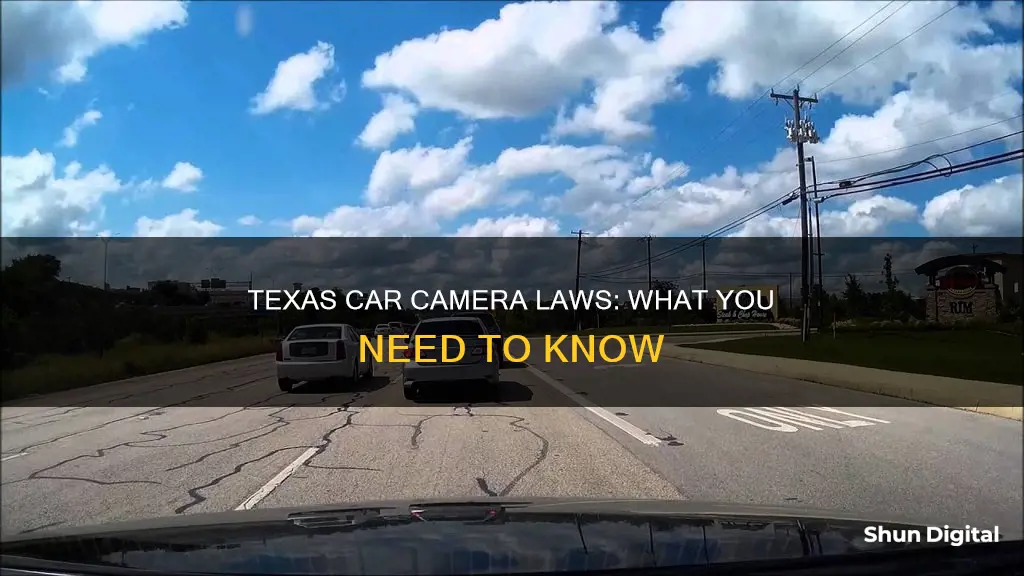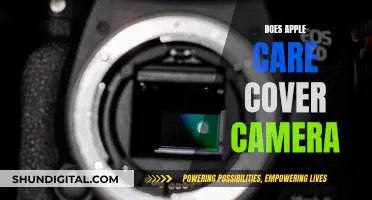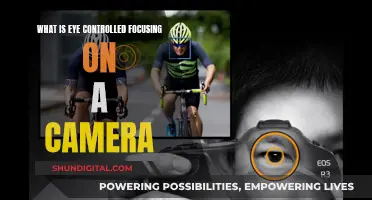
In recent years, the popularity of dashboard cameras has increased among drivers, as the technology has become more affordable. While Texas laws do not specifically mention dashboard cameras, they are legal to use as long as certain conditions are met. These include not obstructing the driver's view, muting audio recording to avoid privacy violations, and ensuring the camera does not distract the driver. Texas has banned the use of red light cameras for traffic enforcement, but some cities have been allowed to keep them running until their existing contracts expire.
| Characteristics | Values |
|---|---|
| Are car cameras legal in Texas? | Yes, but Texas law does not specifically mention dashboard cameras. |
| Can you record video footage? | Yes, as long as the recording device is focused on the road and not specific individuals. |
| Can you record audio? | Yes, but only if you are part of the conversation. |
| Can you record police officers? | Yes, but they may ask you to stop recording. |
| Can dash cam footage be used as evidence? | Yes, dash cam footage is admissible as evidence in most car accident cases in Texas. |
| Can you attach the camera to the windshield? | No, as it is considered a violation of the windshield obstruction law. |
What You'll Learn

Texas law does not mention car cameras
While Texas law does not specifically mention dash cams, there are a number of related laws that users should be aware of. Firstly, Texas law prohibits drivers from operating motor vehicles with any objects or materials attached to the windshield, side window, or rear window that reduce or obstruct the driver's clear view. This is known as the Windshield Obstruction Law (Texas Transportation Code 547.613) and is punishable by a fine of up to $1,000. Therefore, dash cams should be placed in a way that does not obstruct the driver's view. Most people recommend attaching the camera in the bottom left or bottom right corner of the dashboard, or directly behind the rearview mirror, rather than on the windshield itself.
In addition, Texas traffic laws prohibit attaching objects to the dashboard that will obstruct airbags. This is known as the Airbag Obstruction Law. Dash cams should not be placed in a location where the airbag deploys, as this could lead to a traffic ticket and potentially cause serious injuries in an accident.
Another important consideration is audio recording. Many dash cams have the capability to record audio from inside the vehicle. In Texas, it is illegal to record private conversations unless you are a part of them (Texas Penal Code 16.02). Therefore, dash cam users should either mute the audio recording or ensure that at least one passenger is aware of and consents to the recording.
Finally, dash cam users should be aware of Distracted Driving Laws. The dash cam should not distract the driver and lead to traffic infractions, such as failing to yield the right-of-way or following too closely. Drivers should not review dash cam footage while driving, and any screen displaying footage from the dash cam should not be in the driver's line of sight.
The SX-70 Polaroid Camera: A Revolutionary Invention of 1972
You may want to see also

Car cameras are legal in Texas
Car cameras, or dash cams, are legal in Texas. However, there are several laws that users should be aware of to avoid legal trouble. Firstly, Texas Transportation Code 547.613 prohibits objects or materials on a vehicle's windshield, side window, or rear window that obstruct the driver's clear view. This means that dash cams should not be placed on the windshield, and should instead be affixed to the dashboard, preferably in the bottom corner on the front passenger side.
Texas traffic laws also prohibit attaching objects to the dashboard that will obstruct airbags. It is important to ensure that the dash cam does not obstruct the deployment of airbags, as this can lead to both legal consequences and safety hazards in the event of an accident.
In terms of audio recording, Texas Penal Code 16.02 makes it illegal to record private conversations without the consent of at least one party. Therefore, dash cam users should either mute audio recording or ensure that at least one passenger is aware of and consents to the recording.
Additionally, dash cam users should be mindful of distracted driving laws. The dash cam should not distract the driver and should not be positioned in the driver's line of sight. It is also important not to review dash cam footage while actively driving.
Finally, while it is legal to use a dash cam to record police activity, it is recommended to comply with a police officer's request to stop recording, as long as the officer is not obstructing justice.
In summary, car cameras are legal in Texas, but it is important to follow relevant laws and regulations to avoid any legal issues.
Fighting Camera Tickets: Your Rights in New Orleans
You may want to see also

Texas prohibits red light cameras
Texas prohibits the use of red light cameras, also known as photographic traffic signals. This law came into effect in June 2019, banning the use of these cameras to monitor traffic signal violations. The Texas red light camera law, found in Texas Transportation Code Sections 707.020 and 707.021, prohibits local governments from issuing citations or complaints and imposing penalties based solely on images captured by traffic cameras. The law also forbids cities from implementing or operating such systems within their boundaries.
The ban on red light cameras in Texas is a response to concerns about traffic safety and the privacy of motorists. These cameras, often mounted on utility poles at intersections, were used to record drivers who failed to stop at red lights or sped through yellow lights. While some saw these cameras as a necessary safety measure, others viewed them as an invasion of privacy and a source of revenue for cities through fines.
Despite the ban, some Texas cities, such as Humble, Amarillo, and Leon Valley, have continued to operate red light cameras due to a provision in the law. This provision allows municipalities with existing contracts for the installation and monitoring of these cameras to honour those contracts until their expiration. However, these cities cannot enforce any fines or tickets generated through the mail from these cameras.
The use of red light cameras in Texas has been a contentious issue, with proponents arguing for improved traffic safety and opponents citing concerns about privacy and the potential for abuse by local authorities. While the ban provides some relief to motorists, it is essential to remember that intersections remain dangerous, and drivers who cause accidents can still be held liable for their actions.
The Texas red light camera law ensures that motorists are no longer penalised solely based on camera evidence. However, it is worth noting that this law does not prevent local police officers from issuing tickets if they directly observe a traffic violation, such as running a red light.
How to Pay Traffic Camera Tickets in Rhode Island
You may want to see also

Car camera placement laws
Texas laws do not specifically mention dashboard cameras, but this does not make them illegal. It is legal to use a dashboard camera in Texas, but there are a few things to keep in mind regarding placement.
Firstly, Texas Transportation Code 547.613 prohibits drivers from having any objects attached to the windshield, side window, or rear window that obstructs the driver's clear view. This is known as the Windshield Obstruction Law. Breaking this law can result in a misdemeanor charge and a fine of up to $1,000. Therefore, it is recommended to avoid attaching the dash cam to the windshield itself and instead place it in the corner between the windshield and dashboard on the front passenger side.
Secondly, Texas traffic laws prohibit attaching objects to the dashboard that will obstruct airbags. The placement of the dash cam should not be in the path of an airbag deployment, as this could lead to a traffic ticket and potentially cause injuries in an accident.
Thirdly, Texas law prohibits mounting a screen or display for viewing live footage from the dash cam within the driver's view. This is covered under Vehicle TV laws and Distracted Driving laws.
Lastly, while it is legal to record video footage while driving, it is recommended to avoid recording audio. Texas Penal Code 16.02 makes it illegal to record private conversations unless you are a part of them. Therefore, it is advisable to mute the audio recording or obtain permission from passengers before recording.
In summary, when placing a dash cam in your vehicle, ensure it does not obstruct your view of the road, interfere with airbag deployment, or distract you while driving. Additionally, be mindful of audio recording laws and respect the privacy of those in your vehicle.
Shutter Mode Simplified: Easy Steps for Canon Cameras
You may want to see also

Car camera audio recording laws
Texas laws do not specifically mention dashboard cameras or other in-car recording devices, but this does not make them illegal. It is legal to use a dash cam in Texas, but there are several laws that users must be aware of to avoid breaking the law.
Firstly, Texas Transportation Code 547.613 bars drivers from having any objects attached to the windshield, side window, or rear window that reduce or obstruct the driver's clear view. This includes dash cams, and breaking this law is a misdemeanor punishable by a fine of up to $1,000. Similarly, dash cams should not be placed where they will obstruct airbags from deploying, as this could lead to a traffic ticket and cause serious injuries in an accident.
Secondly, Texas audio recording laws must be followed. Texas is a ""one-party consent" state, meaning that as long as one party in a conversation consents, it is legal to record that conversation. In other words, if you are in the car, you may record audio, but you must have the consent of at least one other person in the car to do so. If you are not in the car, it is illegal to record conversations without consent. To be safe, it is recommended that you mute your dash cam to avoid accidentally recording private conversations.
Thirdly, dash cams should not distract the driver and lead to traffic infractions, such as failing to yield the right of way or following too closely. This includes not reviewing dash cam footage while driving and ensuring that any screens displaying dash cam footage are not in the driver's line of sight.
Finally, it is important to note that dash cam footage can be used as evidence in court, either for or against the driver. While attorneys may claim that the footage has been altered, this is rare, and dash cam footage can often help prove innocence or reach out-of-court settlements.
Troubleshooting Blurry Surveillance Cameras: Finding Focus
You may want to see also
Frequently asked questions
Yes, car cameras are legal in Texas. However, there are several laws that users must be aware of to avoid legal trouble.
Texas law does not specifically mention dashboard cameras, but it does include the following:
- Windshield obstruction law: Texas Transportation Code 547.613 bars drivers from operating motor vehicles with any objects or materials attached to the windshield, side window, or rear window that reduce or obstruct the driver's clear view.
- Airbag obstruction law: Texas traffic laws prohibit attaching objects to the dashboard that will obstruct airbags.
- Audio recording restrictions: Texas Penal Code 16.02 makes it illegal to record private conversations unless you are part of them.
- Distracted driving laws: Dashboard cameras should not distract drivers and lead to traffic infractions.
Yes, you can lawfully use a car camera to record police activity as long as you are not obstructing justice. Police do not have the right to ask for your footage without a warrant, nor can they use the footage to determine whether you committed a traffic violation.
Yes, car camera footage can be used as evidence in Texas, either for or against you. It can be submitted to insurance companies or used in court cases.







